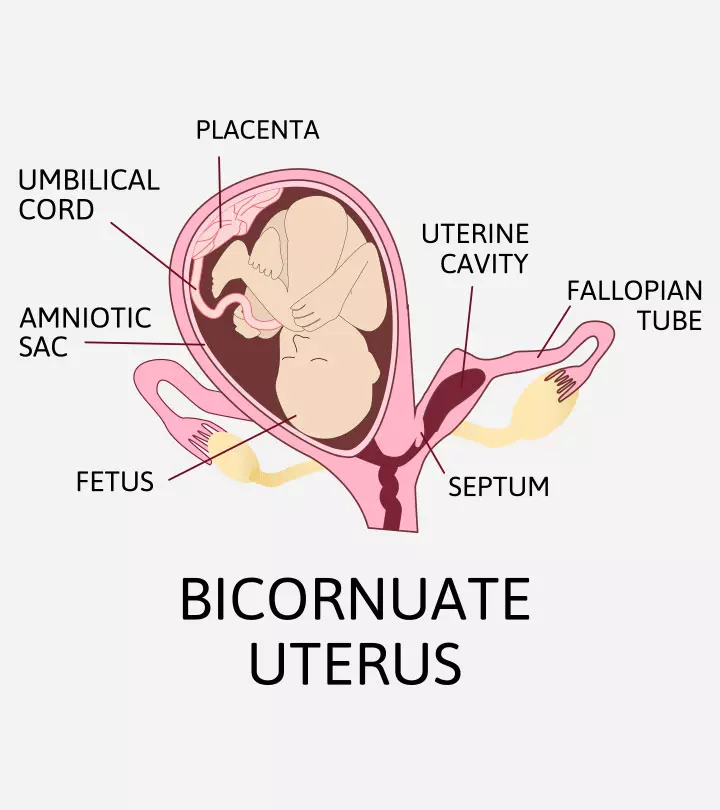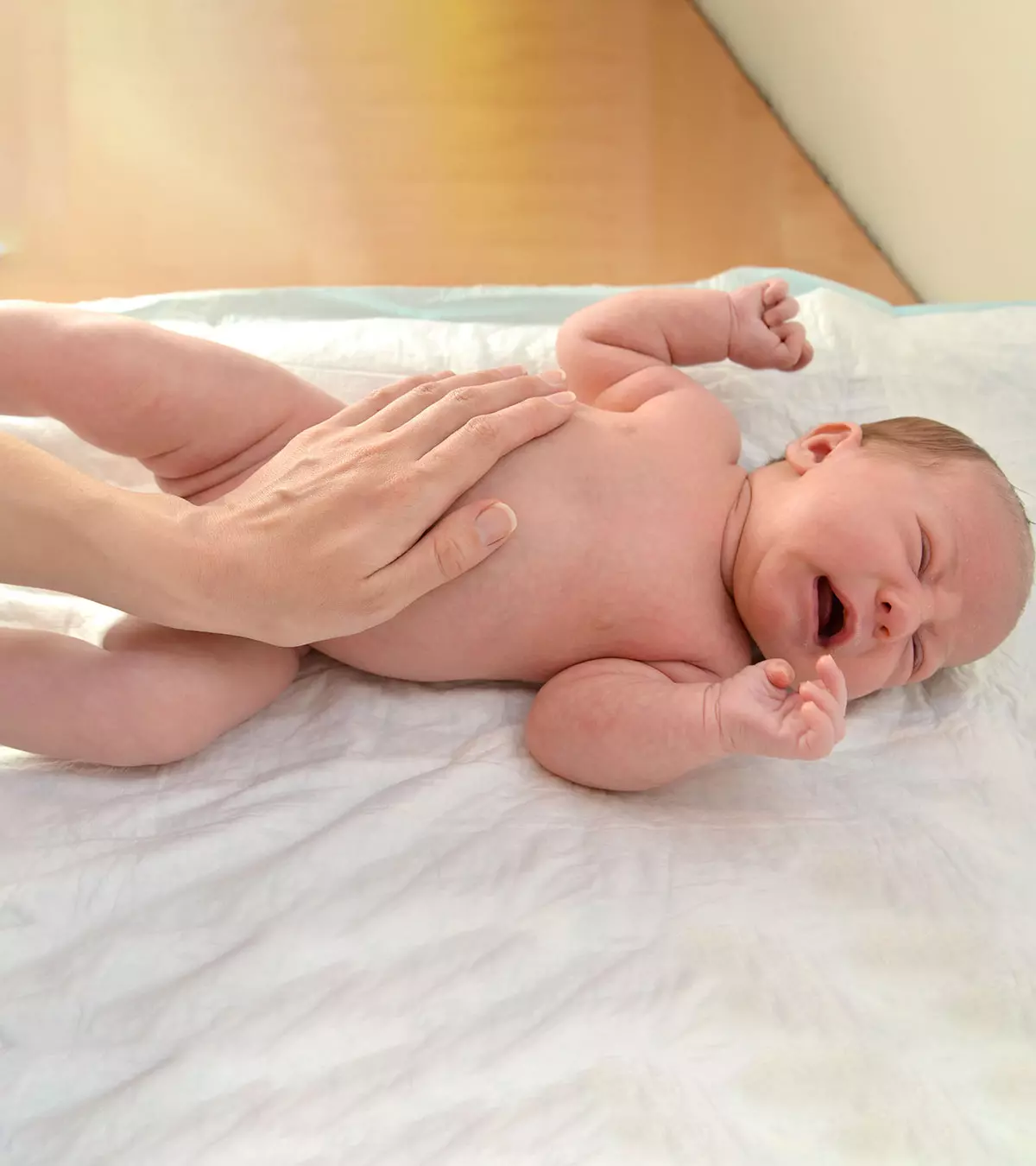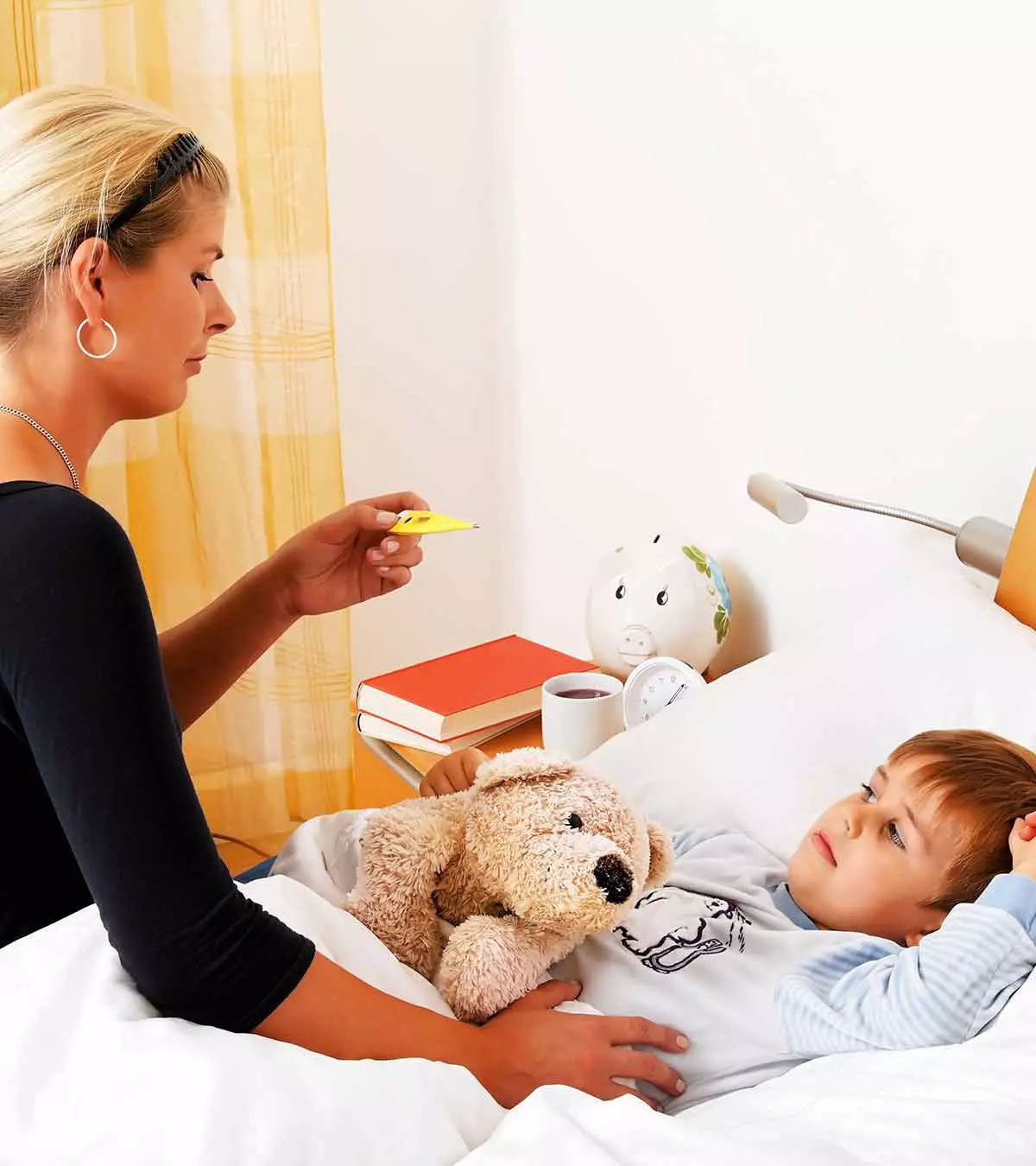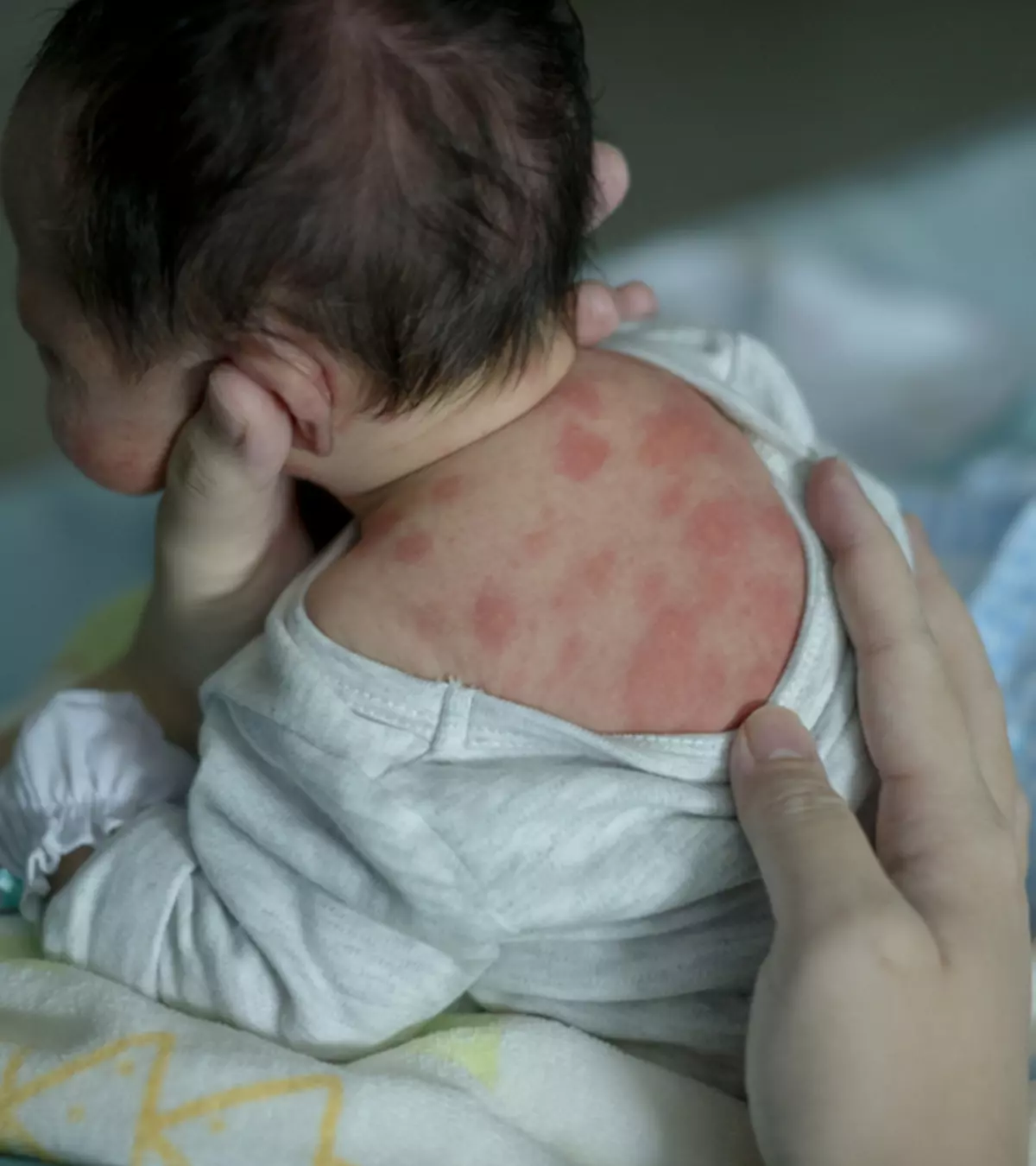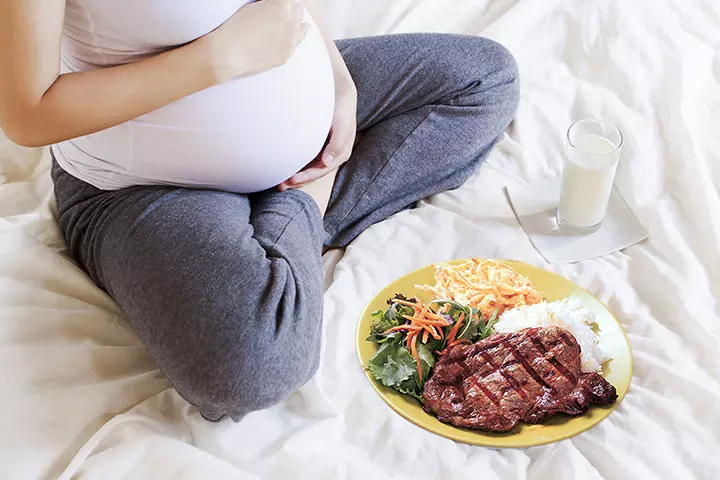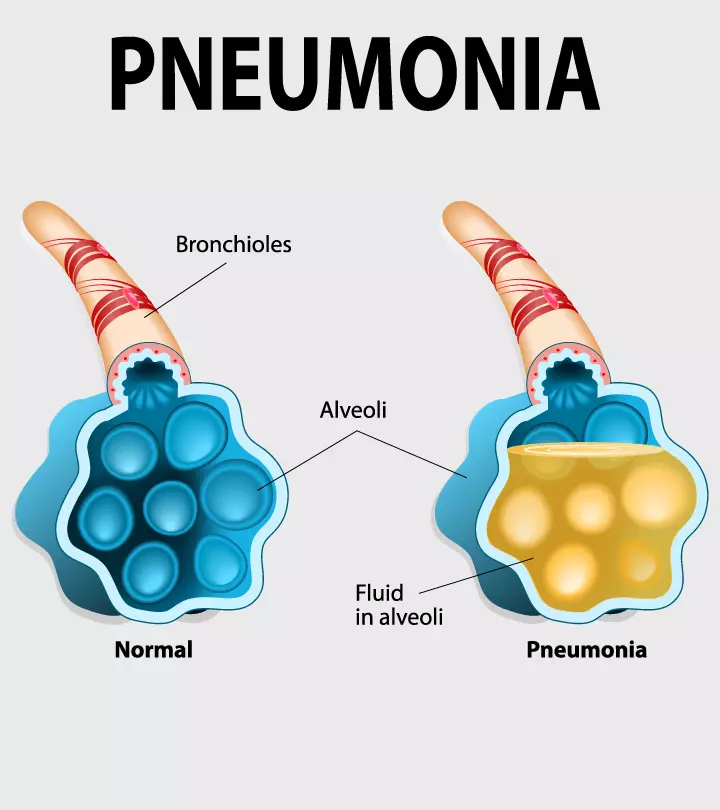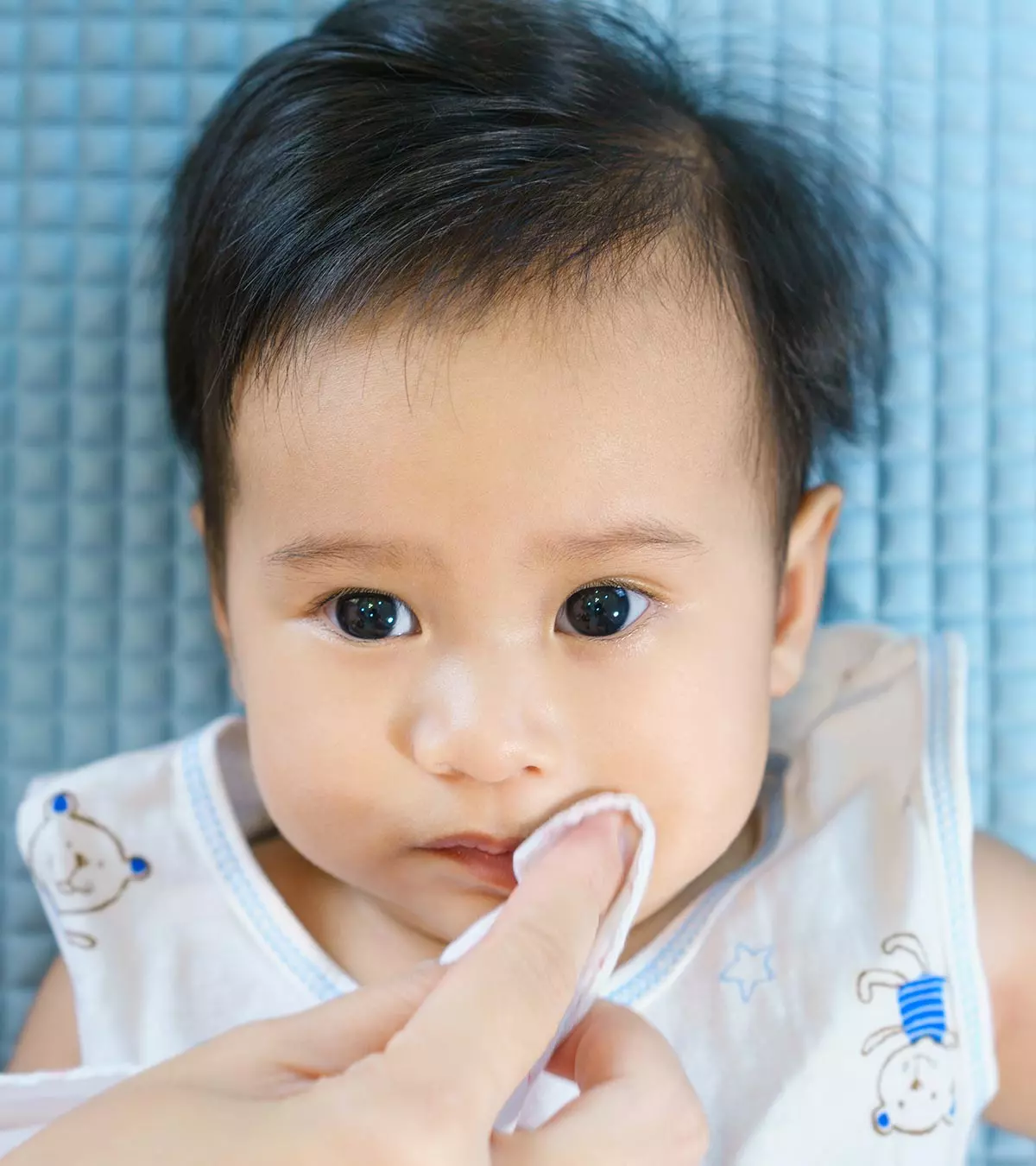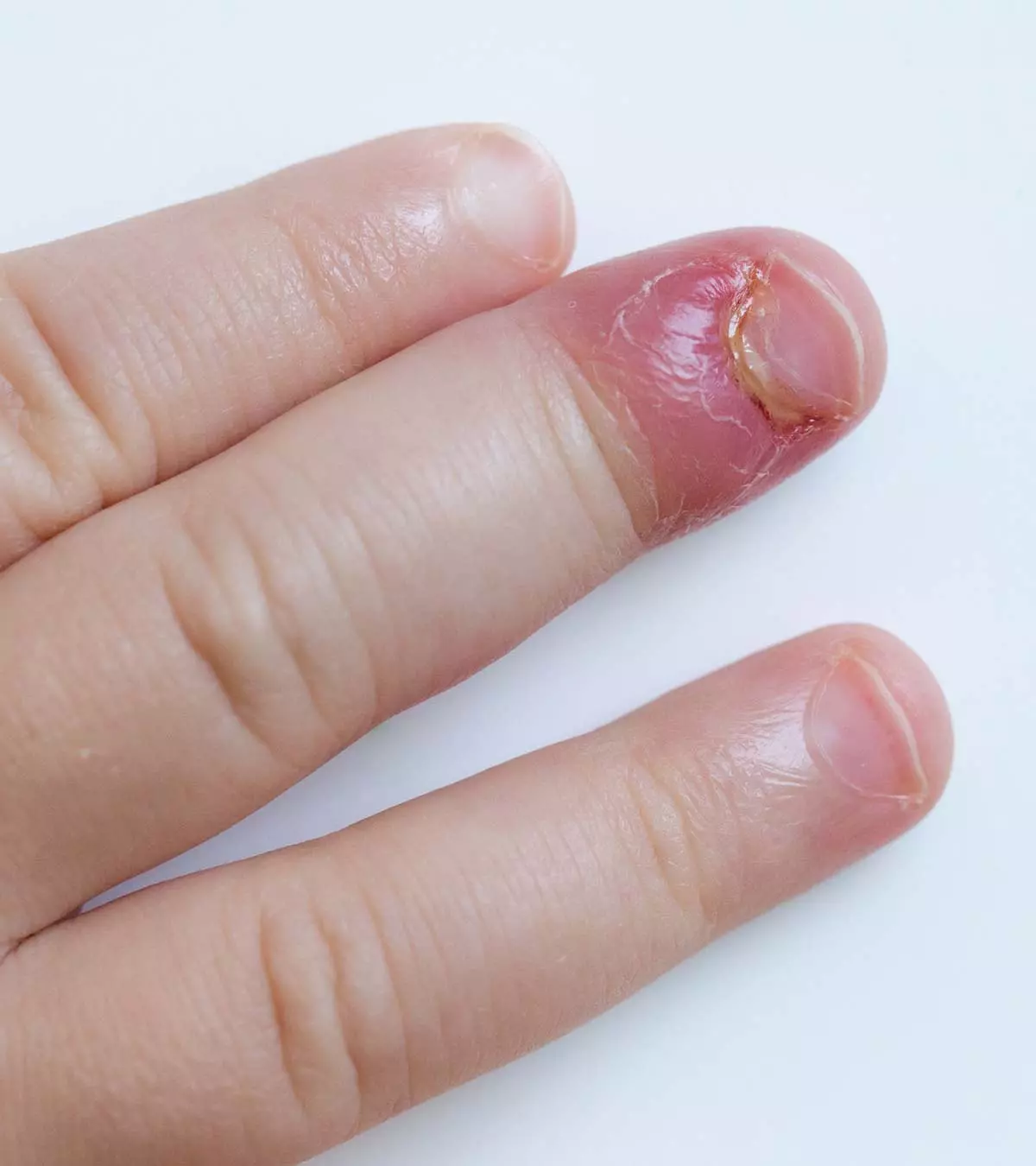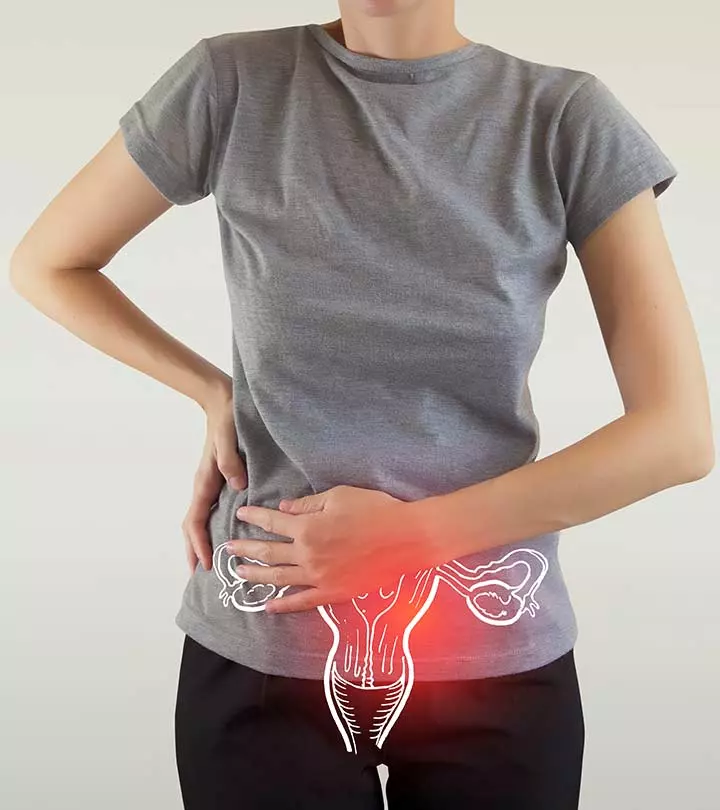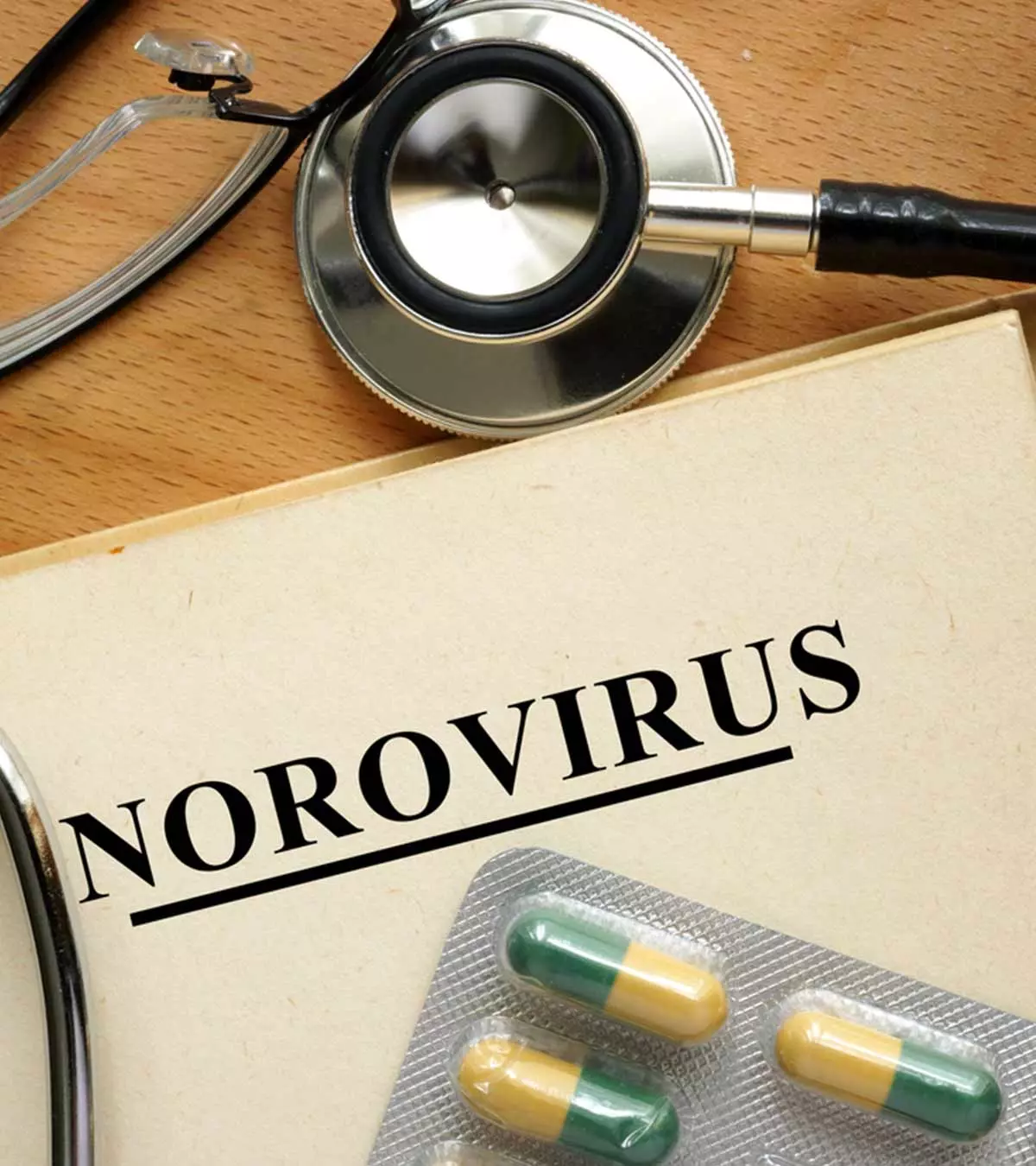
Image: ShutterStock

Norovirus in babies spreads through contaminated food, water, and surfaces, leading to severe gastroenteritis, inflammation of the intestinal walls. According to the Centers for Disease Control and Prevention (CDC), norovirus is responsible for causing about 58% of the foodborne illnesses in the US. Though it can affect people of all groups, norovirus in babies can have severe symptoms and may lead to complications. It may also cause diarrhea and vomiting (1).
Norovirus is also known as a stomach bug, vomiting bug, or winter vomiting bug, and Norovirus-induced viral gastroenteritis is often known as viral gastro, winter vomiting, or gastric flu. In addition, it is commonly called food poisoning or stomach flu. Read on to know more about the symptoms, risk factors, treatment, and prevention of norovirus infection in babies.
Key Pointers
- About 200 million children below the age of five years are affected with norovirus infection globally.
- It spreads through contaminated food, water, and surfaces and causes severe inflammation of the stomach and intestinal walls.
- Vomiting, diarrhea, stomach pain, and fever are the usual symptoms.
- Adequate rest, hydration, increased breastfeeding, and serving easy-to-digest foods are some of the ways to manage the condition.
Is Norovirus Dangerous To Babies?
Norovirus infection could be particularly severe in children younger than five years. According to the US Centers for Disease Control and Prevention (CDC), nearly 200 million cases of norovirus infection occur in children below the age of five years globally (2). Most children affected are between the ages of six months and two years (3).
Newborns, infants, and toddlers may need hospitalization and emergency pediatric visits due to prolonged norovirus symptoms and dehydration. Babies are also more prone to long-term complications, which may often be fatal.
How Does A Baby Get Norovirus?

Image: Shutterstock
A baby could contract norovirus in the following ways (4) (5).
1. Contaminated food
Those with norovirus infection shed millions of viruses in their stool and vomit. If the stool or vomit reaches a water body and the water comes in contact with a food item, then it becomes a disease vector (an agent that transmits a pathogeniMicrobes that cause illness or have the potential to do so ). A food item may also come in direct contact with fecal matter or vomit.
Babies older than six months could contract the virus through the consumption of contaminated food. The virus may reach the food in the following ways.
- Contamination at the source. Vegetables irrigated or washed with contaminated water or seafood reared in water contaminated with fecal matter.
- Contamination during storage. The food item is stored at a place/shelf where there are tiny particles of fecal matter or droplets of vomit.
- Contamination during handling. The food is handled by an infected person who did not wash their hands after using the toilet or vomiting.
2. Contaminated water
A baby can ingest norovirus by drinking contaminated water. The virus may reach the water in the following ways.
- Water is from a contaminated source, such as a river used for open defecation or a lake that also happens to be a reservoir for wastewater.
- Water becomes accidentally contaminated. An example is a household well, which receives a trickle of sewage water due to an underground leak.
3. Contaminated surfaces
It is usually a less common yet possible cause for the spread of the virus. The baby can get norovirus when they touch any surface contaminated by the virus and then place their hands in their mouth. A surface may become contaminated in the following ways.
- An infected person did not wash their hands after using the toilet or vomiting and touched a surface or object, such as a toy, which is commonly used by the baby.
- An infected person vomited near a baby, causing droplets of vomit to settle on various surfaces around the baby, including their clothes.
 Did you know?
Did you know?Risk Factors For Norovirus Infection
The following scenarios and situations could increase the baby’s risk of developing norovirus illness.
- The baby mostly stays near to an infected person, such as a parent or sibling.
- The baby spends time in closed spaces, such as daycare centers, where there are higher chances of coming in contact with contaminated surfaces.
- The baby’s hands are not washed after coming from outdoors.
- The parents have norovirus infection and do not wash hands or maintain adequate personal hygiene. It can cause the parents to spread the virus to the baby’s food.
- The parents do not wash hands after changing the baby’s diapers, causing the spread of the virus from one child to another.
- The baby is given uncooked food or unfiltered water.
- Babies younger than six months could also develop the infection if served unclean water or if their formula milk is prepared using contaminated water.
Symptoms Of Norovirus Infection

Image: Shutterstock
Norovirus is highly contagious, and ingestion of fewer than 100 viruses is sufficient to develop an infection (6). The signs and symptoms usually emerge between 12 to 48 hours, although they may emerge within a few hours after contracting the virus (7).
The virus causes inflammation of the intestinal and stomach walls — a condition known as gastroenteritis. Below are the signs of norovirus-induced gastroenteritis in babies (8).
- Vomiting is the most common sign of norovirus infection among children (normally 2-3 days duration)
- Watery diarrhea that does not contain blood (average 5-7 days duration)
- Stomach pain
- Persistent nausea
- Headache and body ache
- Fever (in up to 60% of kids)
- Loss of appetite
The baby may also display frequent crying, irritability, lethargy, and loss of interest in playing or other activities that they usually enjoy.
Consult a doctor as soon as you notice any of these signs and symptoms. Infants and toddlers are particularly prone to gastroenteritis complications, which can be averted through timely medical intervention.
Diagnosis Of Norovirus Infection
The doctor will check for the presence of watery diarrhea and vomiting in babies, which usually indicate gastroenteritis. The following diagnostic procedures help determine norovirus infection (9).
- Frequency of pooping and vomiting: The number of times the baby poops and vomits could help the doctor determine the type and severity of gastroenteritis. Parents may also be asked about the baby’s feeding pattern and the presence of other symptoms, such as fever.
- Stool culture: A stool sample could be collected from the baby’s diaper. The test is often sufficient to determine the presence of the virus in stools.
- Blood tests: It will detect the presence of antibodies specific to norovirus. Blood tests may be conducted to rule out the presence of other infections or complications.
Treatment For Norovirus Infection

Image: Shutterstock
There is no medicine to cure norovirus infection in babies (10). Antibiotics do not work against viruses. Supportive child care can manage symptoms. The following management steps can help a baby with norovirus infection feel better (11) (12).
- Adequate rest. Let the baby have frequent naps and avoid taking them outdoors or involving them in any physical activity. Rest is essential for the body to fight away the infection.
- Provide adequate hydration. Babies older than six months can be provided frequent sips of water. You can also provide electrolyte solutioniA drink that contains dissolved salts and is used to maintain balance in the body by replenishing lost fluids and minerals . The concentration of electrolyte solution will depend on the baby’s body weight. Therefore, consult a doctor to determine the exact quantity of oral rehydration solution (ORS) needed for your baby. You may prefer premix electrolyte solutions that have a precise quantity of electrolytes needed for the baby.
- Increase breastfeeding. You may increase the number of breastfeeding sessions to provide adequate nourishment. It is often the only source of fluids and nutrients for babies younger than six months.
- Modify formula. If your baby is on a formula diet, speak to a doctor and change it to the one that works well during gastroenteritis.
- Serve BRAT diet. Babies older than six months can be served a BRAT diet, which stands for bananas, rice, applesauce, and toast diet. These food items are bland and easy-to-digest, making them gentle on a digestive system affected by gastroenteritis.
- Serve bland food items. Once your baby starts feeling better, you may serve other bland food items, such as plain noodles, cooked potatoes, soups, cooked vegetables, and salted crackers.
Never give over-the-counter medications to babies without consulting a doctor. In most cases, rest and rehydration are sufficient to make the baby feel better. Your doctor may prescribe you medicines for fever or severe vomiting.
How Long Does Norovirus Infection Last In Babies?
The food poisoning in babies and toddlers lasts up to three days. Infection with severe vomiting and diarrhea may last up to six days. Babies may continue to have mild diarrhea for up to a week, even after the infection subsides. The baby will continue to shed the virus in the stool for a few days after full recovery. Therefore, you must continue to maintain good hygiene to prevent reinfection.
 Quick tip
Quick tipComplications Of Norovirus Infection
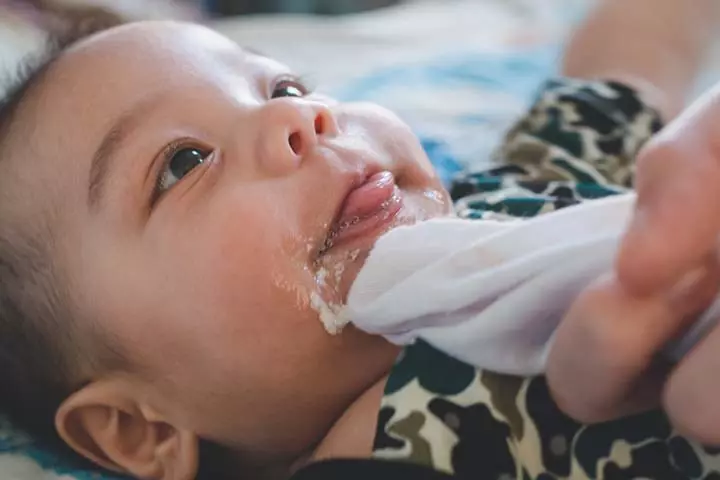
Image: Shutterstock
Most babies seldom experience any adverse effects of norovirus infection. However, some babies, especially those who receive inadequate home care or those with a compromised immune system, could be at risk of complications.
Dehydration is the leading complication that could occur due to the constant loss of fluids and electrolytes through vomiting and diarrhea in babies. Malnutrition may occur temporarily if the baby is not provided a healthy diet. In rare cases, immunocompromised babies and premature infants may develop necrotizing enterocolitis where the intestinal tissue necrotizes (begins to die) (13).
Parents must be alert to signs of dehydration that include the following (14).
- Less urination; fewer than six wet diapers a day
- Dark, concentrated urine
- Fewer or no tears while crying
- Parched mouth
- Severe fussiness
- Excessive sleepiness
- Sunken eyes
- Sunken soft spot or fontaneliA soft area in babies’ skull covered with a strong, fibrous membrane, which helps them to pass through the birth canal during delivery on the skull
- Hands and feet are unusually cold to touch
Babies who present these signs during a doctor’s visit could be immediately referred for hospitalization. The baby will receive intravenous rehydrationiA procedure of injecting specially formulated fluids in patients to help them recover from sickness, injury, or dehydration and nutrition for stabilization of the body’s electrolyte balance.
The highest risk population for severe complications will be babies under 12 months age and people with a compromised immunity.
 Caution
CautionPrevention Of Norovirus In Babies
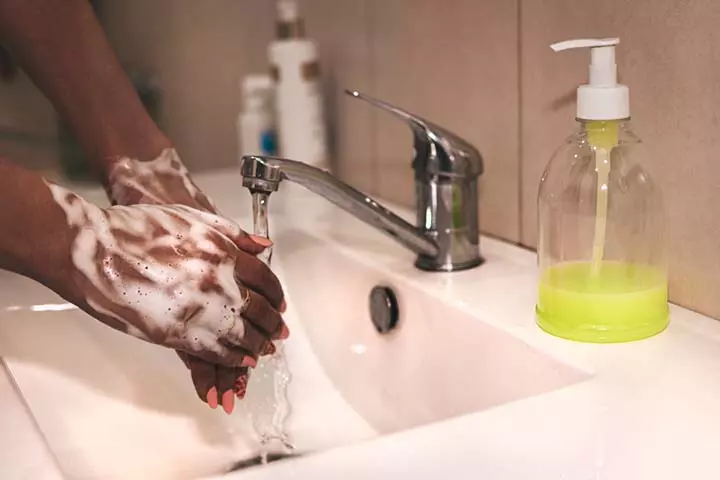
Image: Shutterstock
Adequate food and personal hygiene is the only way to prevent norovirus infection in babies. There is no vaccine for norovirus.
It is important to note that norovirus is not killed by alcohol or most standard cleaning agents. Hand hygiene for people with gastroenteritis should consist of washing hands with soap and water (rather than alcohol). Contaminated environmental surfaces should be disinfected with bleach if possible. People with norovirus infection should refrain from preparing food for others until at least two days after symptoms stop.
You should observe the following practices to eliminate the risk of norovirus infection in babies (15).
- Keep the baby away from someone who has stomach flu. If there is an outbreak, do not send your baby or toddler to daycare.
- Wash hands with soap and water thoroughly for 20 seconds before preparing your baby’s meals or touching their belongings. It should be done even if you do not have any norovirus symptoms.
- Clean any surfaces and objects, including baby’s toys, with baby-safe disinfectants. Not all disinfectants work on norovirus, so pick the one that is effective. Alcohol may not kill norovirus.
- Buy vegetables, fruits, and meat from trusted sources. Wash them under running water thoroughly to rinse away any pathogens on their surfaces.
- Cook vegetables and meats to at least 140°F or 60°C to kill norovirus. Fruits that cannot be cooked should be washed thoroughly with clean water before being served. Prefer serving the baby home-cooked food to reduce the risk of infection.
- Serve the baby clean drinking water from a reliable source. To ensure your drinking water is safe, especially in places where water quality may be uncertain, using a water filter is a good idea.
- If a parent has developed a norovirus infection, they must avoid preparing meals for the baby. However, you may continue to breastfeed, preferably by feeding expressed milk. Make sure to wash hands thoroughly with soap and water before expressing breast milk.
- Wash hands each time after changing the baby’s diapers. Dispose of the diapers in a diaper pail, which should be disinfected periodically.
- If a baby has developed norovirus infection, dispose of their diapers in a sealed plastic bag to prevent transmission of infection. It is even more vital if there are other children at home.
- Wash the infected child’s clothes separately to prevent accidental transmission. Use a baby-safe laundry disinfectant to wash the clothes.
 Quick tip
Quick tipFrequently Asked Questions
1. Is norovirus recurring?
Yes, norovirus gastroenteritis may happen more than once. There is no vaccine for norovirus, and the body may not develop immunity even after a bout of infection.
2. How long does the norovirus live on surfaces?
Norovirus may stay dormant on surfaces for days or even weeks until eliminated with a disinfectant.
3. Does norovirus spread by coughing?
Coughing and sneezing are not considered significant modes of transmission for enteric viruses such as norovirus. However, tiny particles of vomit spray from an infected person may be airborne. These particles may contaminate surfaces or enter a person’s mouth and cause infection (5).
4. Can breastfed babies get norovirus?
Breastfed babies may get norovirus. However, exclusive breastfeeding has been found to have a protective effect against this stomach bug. The effectiveness of breastfeeding against diarrhea may be due to the IgA antibodies that are transferred to the baby via breast milk (16).
As per the CDC, norovirus in babies is a concerning condition since it may cause severe dehydration and other complications such as malnutrition or necrotizing enterocolitis. Follow proper personal hygiene since this infection is caused by contaminated food or water and spreads through infected people. Keep the baby away from infected people and never give them uncooked food. Also, if you notice any symptoms of norovirus, consult your health professional for prompt medical attention. If diagnosed, ensure they have a healthy diet, plenty of fluids, and good rest to help them recover.
Infographic: What Can Increase The Risk Of Your Baby Getting Norovirus Infection?
Norovirus usually spreads through contaminated food, water, and surfaces; a lack of adequate hygiene can increase the risk of infections. The infographic below lists the risk factors for norovirus infection in babies that may help you take precautionary steps to prevent it.
Some thing wrong with infographic shortcode. please verify shortcode syntaxNorovirus is a highly contagious virus that causes diarrhoea and vomiting. It is sometimes referred to as the ‘winter vomiting bug’. Find out more about this virus in this video.
References
1. Norovirus; NHS UK
2. Norovirus Facts and Stats; CDC
3. Minesh P. Shah and Aron J. Hall, Norovirus Illnesses in Children and Adolescents; U.S. National Library of Medicine
4. Norovirus Infections; U.S. National Library of Medicine
5. How Norovirus Spreads; CDC
6. Rachael S et al. Preventing Foodborne Illness: Norovirus, National Institute of Food and Agriculture, USDA
7. Bacteria and Viruses; U.S. Department of Health & Human Services
8. About Norovirus; CDC
9. Gastroenteritis In Children; Harvard Medical School
10. Norovirus infection – including symptoms, treatment and prevention; Government Of South Australia
11. Diarrhea in Babies; American Academy of Pediatrics
12. The BRAT diet: What to eat after a stomach virus; Piedmont Healthcare
13. Elizabeth Robilotti, Stan Deresinski, and Benjamin A. Pinsky, Norovirus; American Society for Microbiology
14. Signs of Dehydration in Infants & Children; American Academy of Pediatrics
15. Norovirus Fact Sheet; County of Los Angeles
16. Hannah Karen Mina Labayo et al.; Norovirus-specific immunoglobulin A in breast milk for protection against norovirus-associated diarrhea among infants; The Lancet
17. Clean-up and Disinfection for Norovirus (“Stomach Bug”); Public Health Madison & Dane County
18. Norovirus; Nemours Kids Health.
Community Experiences
Join the conversation and become a part of our nurturing community! Share your stories, experiences, and insights to connect with fellow parents.
Read full bio of Dr. Wayne Hough
Read full bio of Dr Bisny T. Joseph
Read full bio of Rohit Garoo
Read full bio of Shinta Liz Sunny





